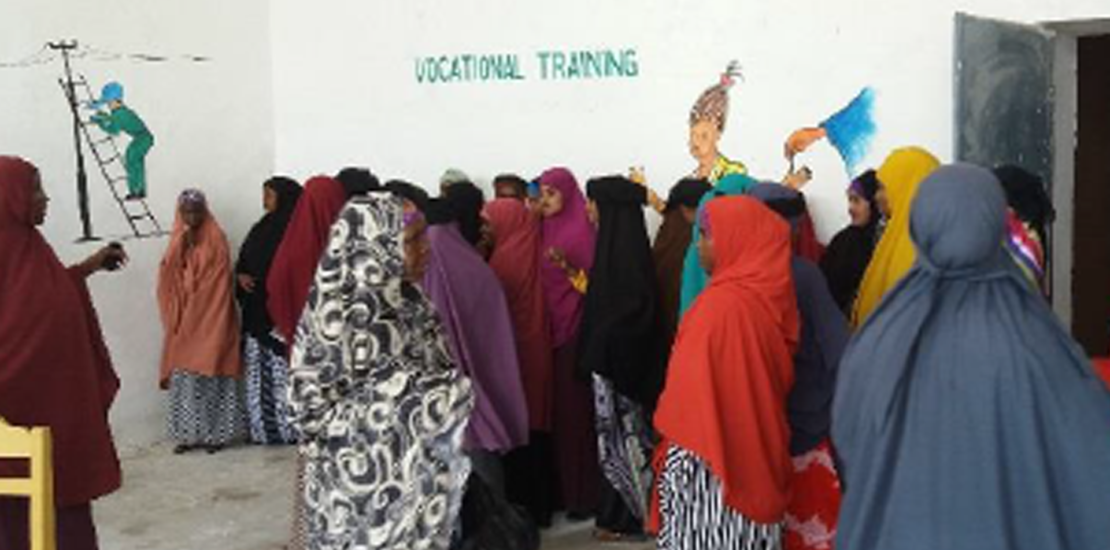End-line Evaluation of the Voucher for Training Project Report (VFT) Implemented by CCS in Mogadishu-Howlwadaag District.
- January 22, 2016
- Posted by: e@gleconsulting
- Category: Research & Data Consulting, Uncategorized

Background:
Access to education in Somalia is among the lowest in the world, especially for girls and women. Much of the population including many youths do not have sufficient skills to take advantage of income generation and employment opportunities. Community Concern Somalia (CCS) through support from WFP initiated a vocational training targeting internally displaced persons (IDPs) and other vulnerable host community in Howlwadag district in Somalia. The choice of the district was necessitated by food insecurity and high number of IDPs and marginalized groups who have no access to food and other households’ demands. The district has a high number of IDPs and also has high number of the population lacking basic items. The district has a high number of unemployed youths and women head households. The population has fewer assets to sustain their livelihood. Large number of the population depends on humanitarian services for food and other basic requirements. High number of the population lack basic education and skills for competitive advantage on job opportunities and initiation of self-employment. The project seeks to provide entrepreneurial skills to the target beneficiaries for job market and business initiatives through Voucher for Training project.This project targeted those with acute food insecurity and need to improve their livelihood conditions but have less coping mechanisms. The project aimed to address the need for skills training among unemployed and underemployed persons, to enable them to find jobs, move up the skills value chain or earn income through self-employment. Training subjects were selected based on an assessment of growing sectors and skills gaps in the economy.Participants were enrolled in the subjects of cookery, auto electricity and Beauty salon.
This report is for end of project evaluation in Howlwadag District where VFT project was implemented by CCS.
Methods:A mixed-methods approach using both qualitative and quantitative face-to-face data collection methods were used to gather data from Howlwadag District. The qualitative phase conducted in-depth interviews with teachers and focus discussion group with the project beneficiaries.The quantitative phase randomly sampled195 respondents (118 for cookery, 45 for beauty/salon training and 32 for auto- electricity).
Results:The VFT training reached the relevant intended audience because 27% of the beneficiaries had attained formal educationwhile majority, 83% had no formal education. The cookery component was attended by many people at61%,23% attended the beauty/salon and 16%attended the auto-electric training.
Thetraining was most relevant to the female beneficiaries seeing that 75% had never attended any formal school against the 65% of the male beneficiaries.
The data showed that the project had positive impact on the lives of beneficiaries as majority of the beneficiaries reported that the relevance of training content to their practical needs as the reason why they liked the training most.
Beneficiaries cited that they felt more confident to speak up in their communities and they were confident to take leadership position in the community
Conclusions and Recommendations: The project was impactful to the lives of beneficiaries. CCS would benefit from additional funding to reach more people in this region, or to initiate the same project in other regions that have high dependency and vulnerability levels. There is therefore need for continued lobbying and advocacy for funds for vocational training.
A community resource centre should be established for learners to access tools and materials for training materials as majority of respondents across the different training component reported that they did not access the training assorted items and the startup kits.A minority of the respondents reported that they did not benefit from the training as they did not acquire the skills they had expected.Teachers should be flexible to cater for the needs of slow learners.
The sustainability plan should include ensuring that the groups have financial support and supply of start up kits to start businesses. Participants reported that the main challenge in running business was lack of money.
Introduction
The CCS with support from the WFP instigated a project to provide entrepreneurial skillsin cookery, auto-electric work and beauty salon skills to the vulnerable community membersinHowlwadag District. This district is known to have food insecurity and high number IDPs and marginalized groups, in addition to the low/lack of basic education for job opportunities and self-employment.
The project intended to address the need for skills training among unemployed and underemployed persons, to enable them to find jobs, move up the skills value chain or earn income through self-employment.
Description of the VFT Project
The overall objective of the project is to restore and rebuild lives and livelihoods and improve resilience that is in-line with WFP strategic objective, enhancing medium and long-terms resilience in vulnerable communities through VFT interventions.
The VFT project targeted beneficiaries with vulnerability indicators such as asset ownership, household size, gender of household head, membership of minority group, etc. Special consideration was given to female-headed households, persons with disabilities, food insecure, displaced persons and multi-family households with many dependents.
The specific objectives of the project to the beneficiarieswas to train beneficiaries on how skills that they could use to develop and sustain jobs and enterprises for improved incomes and improved livelihoods.
CCS provided training skills to 400 beneficiaries: 224 on cookery, 60 on beauty salon and 116 on auto electricity. The main project activities undertaken included: mobilization of the target community members, registration of 400 beneficiaries in Howlwadag district. The 400 persons were under training with vouchers for training support and the participants attended half-day classes for up to 26 days per month. CCS completed VFT registration on 6thFebruary2017 and started training classes on 13thFebruary 2017.Classes ran normally in two shifts morning and afternoon.









